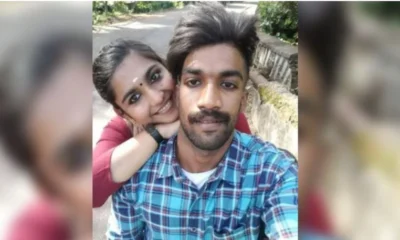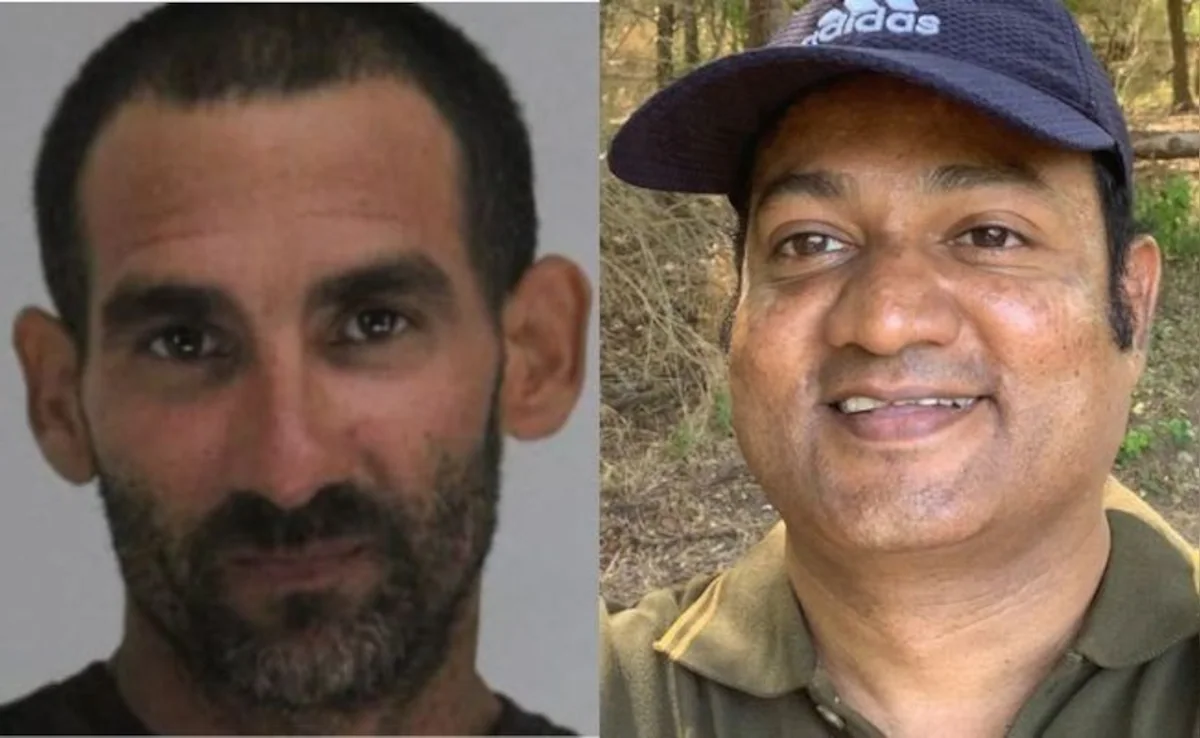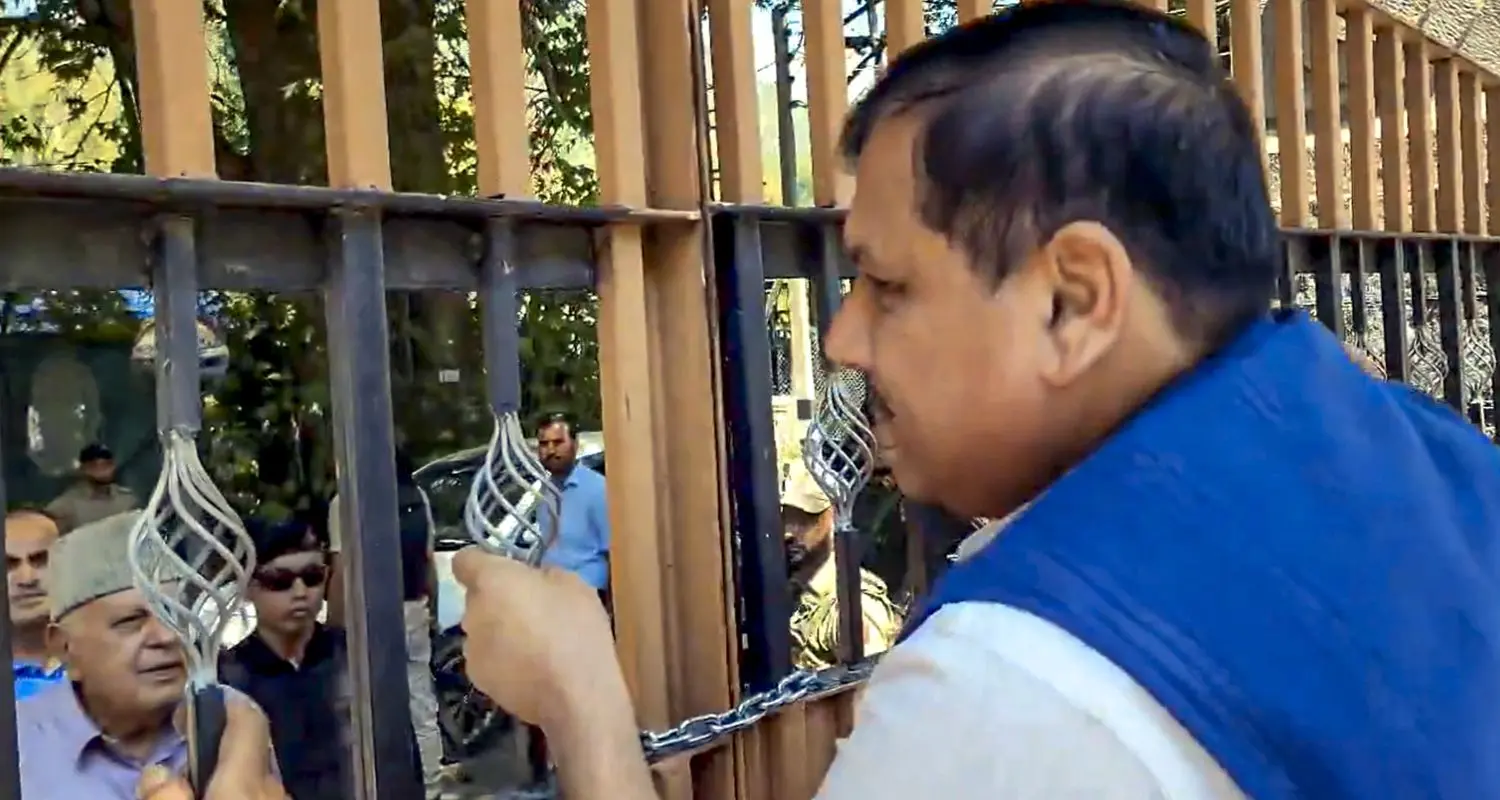Latest News
Nipah outbreak: one confirmed case, four under watch; Kerala sets up protocols to check spread
Published
7 years agoon
By

[vc_row][vc_column][vc_column_text]A 23-year-old male student has tested positive for Nipah virus, said Kerala Health Minister KK Shylaja today (Tuesday, June 4).
Four others, including two nurses, who have been in contact with the ‘index patient’ at the hospital, have fever and are being monitored. Though their condition is not said to be serious, one of them has been shifted to the isolation ward.
Over 80 people, among them 22 students, were put under surveillance on Monday, media reports said.
The deadly Nipah virus had claimed 17 lives in Kerala last year. According to the World Health Organisation, 18 Nipah cases were reported in Kerala last year; 17 of them died. The first death was reported on May 19, 2018. Since then, more than 2,600 contacts were identified and followed up with during the outbreak.
Union Health Minister Harsh Vardhan said he is in touch with Kerala Health Minister KK Shylaja. “The Centre will send monoclonal antibody (medicines) to Kerala. Everything that needs to be done in a scientific manner has been initiated. Nothing to panic,” Harsh Vardhan said. He said the wildlife department has been told to catch bats to test presence of the virus.
The medicine, sourced from Australia after the Nipah outbreak last year, is available only with the National Institute of Virology. It was used as a preventive medicine for people who were exposed to the Hendra virus in Australia, which mainly infects large fruit bats (flying foxes) and can be passed on to livestock and people.
The source of the latest Nipah virus outbreak is not known, said KK Shylaja. “The test results have come from the National Institute of Virology, Pune, and it’s positive for Nipah. The health authorities have made elaborate arrangements… NIV authorities will be handing over the medicines that have come from Australia,” said Ms Shailaja, adding Harsh Vardhan has assured of full support.
“The condition of the youth is now stable and he is not on life support system. The situation is under control. As the government had addressed the Nipah outbreak in an effective manner last year, we are fully confident to meet any eventualities. People should cooperate with the general guidelines and precautionary measures issued by the health department,” Shylaja said.
The government said that it was according high priority to the team of doctors and nurses treating the index patient at the private hospital. Protective suits have been handed over to healthcare teams dealing with the crisis first-hand. Ambulances and rapid response teams have also been kept in the loop.
While commending the mainstream media for its role in making people aware of the dangers of Nipah, Shylaja cautioned those on social media platforms from spreading fake news. “The government will not spare anyone spreading unverifiable news on social media. Strong action will be taken,” she said.
Shylaja also advised the public to remain more vigilant in the current circumstances. People with fever and cough must avoid going to public gatherings and should get diagnosed immediately.
The 23-year-old patient, seen as the ‘index’ case of the virus, is a native of Paravur in Ernakulam district. He is a student of an institute near Thodupuzha and had attended a camp in Thrissur district. All those who were in contact with him during the period when he had fever are also being monitored by the health department.
Having gained the experience from battling the virus infection last year, the health minister said her department is fully equipped to deal with any kind of emergency. As precautionary measures, isolation wards have been ordered in three districts – Ernakulam, Thrissur and Kozhikode.
An expert team of doctors, including those who battled the virus last year in Kozhikode, are present in Kochi to monitor the situation. Ribovarin tablets, an antiviral medication used as part of supportive care, are in ample stock. Private hospitals and those on the periphery have been directed to send all suspected cases to Medical Colleges where the patients can be admitted to isolation wards.
A six-member expert team from various institutes under the Union Ministry has already arrived here for supervision. The Union government has given permission to use immunoglobulin-monoclonal antibody, if necessary. Steps have also been taken to procure more of these antibodies from Australia.
“There’s no need to panic or be scared. Since we have the experience of last year, we can take the virus head-on. We have a set of guidelines that we are adhering to. We advise everyone who has fever-like symptoms to get diagnosed immediately,” Shylaja said.
The control room under the District Collector will be coordinating all activities under the Nipah control programme, Shylaja said.
Earlier outbreaks
The Nipah virus, an emerging zoonotic disease, is transmitted from animals to humans and then spreads through people to people contact. It was first identified in 1998-99 among pig farmers in Malaysia and Singapore. More than 100 people died in that outbreak that year, and about a million pigs were killed to try to halt its spread.
According to the World Health Organisation (WHO) India reported two outbreaks of Nipah virus encephalitis in West Bengal, bordering Bangladesh, in 2001 and 2007. Seventy one cases with 50 deaths (70% of the cases) were reported in two outbreaks.
The first identification of Nipah virus as a cause of an outbreak of encephalitis was reported in 2001 in Meherpur district of Bangladesh. The WHO says Nipah virus (NiV) encephalitis is an emerging infectious disease of public health importance in the South-East Asia Region.
Nipah virus: fatality rate, symptoms, precautions
Fruit bats are considered to be the natural carriers of the virus. In Kerala, the virus was reported last year in patients in Kozhikode and Malappuram district and had led to 17 deaths. The virus has a high case fatality rate hovering between 40-75%.
It is associated with fatal encephalitis and respiratory illness. In initial stages, it causes fever, headache, muscle pain, dizziness and nausea. There is no known vaccine against the virus.
The virus spreads through the saliva of bats etc. is what research has found until now. In Bangladesh too, the virus outbreak happened after people consumed date palm sap eaten by bats carrying the virus.
In places where there are a lot of bats, one has to be extra careful to not eat fruits.
The incubation period for the virus ranges from 5 to 14 days. Symptoms become visible after this period and include fever, head ache, fainting and nausea. In some cases, symptoms like choking, stomach pain, vomiting, fatigue and blurred vision could also be there.
The patient can possibly go into a coma just two days after the symptoms begin.
The chance of contracting encephalitis that affects the brain is also high.
Precautions include avoiding food that could have been contaminated by bats by biting it or dropping faeces on it.
Toddy that is brewed in open containers near palm trees should be avoided.
In case a person is infected, it is important to maintain a distance from the patient person and to sanitise and wash hands thoroughly.
Clothes, utensils and items typically used in the toilet or bathroom, like buckets and mugs, should be cleaned separately and maintained hygienically.
It’s important to cover one’s face while transporting the dead body of anyone who dies after contracting Nipah fever and should take utmost care while bathing the body before cremation or burial.
[/vc_column_text][/vc_column][/vc_row]
You may like
-


Ajit Pawar concedes civic poll setback, says public mandate is supreme
-


PM Modi takes a dig at INDIA bloc over presence of Kerala CM Pinarayi Vijayan, Shashi Tharoor
-


Rahul Gandhi writes to PM Modi seeking cancellation of tenders for offshore mining in Kerala, Gujarat, Andaman and Nicobar Islands
-


Lionel Messi to visit India in October as Argentina schedules exhibition match in Kerala
-


Pune Police arrest man for duping people with fake Army recruitment scam
-


Kerala woman sentenced to death for poisoning boyfriend to end relationship
Entertainment
Kapil Sharma warned by MNS for referring to Mumbai as Bombay on Netflix show
Published
5 months agoon
September 12, 2025
Bollywood comedian Kapil Sharma has come under the radar of the Maharashtra Navnirman Sena (MNS) after the use of the term Bombay instead of Mumbai on his Netflix show The Great Indian Kapil Show. MNS spokesperson Ameya Khopkar issued a warning, stating that the usage of the city’s former name could hurt the sentiments of its residents and demanded that the correct name, Mumbai, be used.
The controversy arose during an episode featuring actress Huma Qureshi, her brother Saqib Saleem, and the Shetty sisters. While talking about her bond with Saqib, Qureshi referred to the city as Bombay, explaining that she felt at home with him despite not being originally from the city. This comment drew criticism from the MNS, who have historically been vocal about protecting the identity and pride of Mumbai.
In a post on X, Khopkar stated in Marathi, that even though 30 years have passed since Bombay was officially renamed Mumbai, the term Bombay is still frequently used by celebrity guests on The Kapil Sharma Show, Delhi-based Rajya Sabha MPs, show anchors, and in many Hindi films. He noted that the name change was officially recognized by the Maharashtra government in 1995 and by the Central Government in 1996, preceding similar renamings in other major cities such as Chennai, Bengaluru, and Kolkata.
Khopkar further emphasized the seriousness of the matter during a media interaction in Mumbai. He stated that Sharma had been working in Mumbai for many years and described the city as his land of work. He added that the people of Mumbai admire him and watch his shows, and warned that the city and its residents should not be insulted, cautioning Sharma against repeating the mistake.
He added that if the reference had been made unintentionally, the mistake should be corrected immediately. Khopkar stated that all guests on the show, including celebrities and the host, should be informed in advance to refer to the city as Mumbai. He warned that if this is not followed, the MNS would launch a strong agitation.
The Great Indian Kapil Show has recently been renewed for a third season. Its first two seasons, comprising 13 episodes each, premiered in 2024, featuring a mix of Bollywood celebrities and entertainers. The controversy marks one of the few instances where the city’s political groups have publicly intervened over the naming of Mumbai on popular entertainment platforms.
Latest News
Indian-origin motel manager beheaded in the US
Published
5 months agoon
September 12, 2025
In a horrifying incident in Dallas, Texas, an Indian-origin motel manager, Chandra Nagamallaiah, was brutally beheaded by a guest following an argument over a malfunctioning washing machine. The gruesome attack was carried out by 37-year-old Yordanis Cobos-Martinez in front of Nagamallaiah’s wife and children, leaving the family traumatized.
According to court records and affidavits, the confrontation began when Nagamallaiah reportedly told Cobos-Martinez not to use a broken washing machine at the Downtown Suites motel. The suspect became enraged, partly because the manager relied on a woman present for translation instead of speaking directly to him. Surveillance footage later revealed Cobos-Martinez producing a machete and repeatedly stabbing and cutting Nagamallaiah, despite the efforts of his wife and child to intervene.
The affidavit details that the victim tried to flee to the motel’s front office while screaming for help, but the attacker followed him and continued the assault. Cobos-Martinez removed Nagamallaiah’s key card and cellphone before ultimately beheading him. Disturbing footage reportedly shows the suspect kicking the severed head across the ground before throwing it into a trash bin.
Cobos-Martinez, a Cuban national with a long criminal history, including convictions for grand theft, carjacking, false imprisonment, and sexual offenses, was arrested shortly after the attack. Authorities found him a block away wearing a blood-soaked T-shirt, along with the victim’s key card and cellphone. U.S. Immigration and Customs Enforcement (ICE) officials noted that Cobos-Martinez should not have been in the country at the time, as previous attempts to deport him to Cuba were unsuccessful due to his criminal record.
The Department of Homeland Security described the beheading as unthinkable and stated that the case highlights the critical need for strict immigration enforcement. A witness to the attack told NBC DFW that they could not explain what they saw, describing the suspect as appearing there and not there at the same time, emphasizing the surreal and terrifying nature of the crime.
This shocking incident has left the Dallas community and Nagamallaiah’s family in deep distress, as authorities continue their investigation into the motive and circumstances surrounding the brutal murder.
India News
AAP MP Sanjay Singh accuses J&K authorities of house arrest, Farooq Abdullah condemns move
Published
5 months agoon
September 11, 2025
Aam Aadmi Party (AAP) MP Sanjay Singh on Thursday accused Jammu and Kashmir Lieutenant Governor Manoj Sinha of placing him under house arrest while he was in Srinagar to protest the detention of the party’s sole J&K MLA, Mehraj Malik.
Singh climbed the gate of a government guest house in Srinagar to meet National Conference (NC) chief Farooq Abdullah and later shared visuals of the interaction on social media. He said it was a very sad thing that Abdullah, who has served multiple terms as Chief Minister of Jammu and Kashmir, came to meet him at the guest house after learning about his alleged house arrest but was not allowed to do so. Singh further questioned the authorities’ actions, asking whether if this is not dictatorship, then what it is.
Malik, the MLA from Doda Assembly seat, has been detained under the Public Safety Act (PSA) on charges of disturbing public order. This marks the first instance of a sitting lawmaker being booked under the PSA, which allows authorities to detain individuals without charge or trial for up to two years. Singh alleged that Mr. Malik’s detention was retaliation for raising people’s issues in his constituency.
Abdullah also condemned the attempts to stop Singh from holding his protest. In a statement to news agency ANI, he said that preventing Singh from exercising his right to protest was absolutely wrong and accused the Lieutenant Governor Sinha of misusing his powers. He stressed that the right to protest is guaranteed by the Constitution of India, noting that Jammu and Kashmir being a union territory gives the LG significant authority, which, according to him, was being used for the wrong purposes. Abdullah questioned whether it was necessary to prevent Singh from speaking and asserted that this is not an autocracy, there is a constitution here.
Abdullah drew parallels with the recent unrest in Nepal, where protests led to the resignation of Prime Minister KP Sharma Oli, and cautioned that India must safeguard its Constitution to prevent similar circumstances. He urged the LG to uphold constitutional principles, warning that failure to do so could risk unrest, and emphasized the need to take care of the Constitution before such a fire breaks out in the country.
Other opposition leaders, including AAP chief Arvind Kejriwal and Shiv Sena (UBT) leader Sanjay Raut, also expressed concern over the move, condemning what they described as an infringement on democratic rights.

India studying implications after US Supreme Court strikes down Trump’s global tariffs
RSS not seeking political power, focused on uniting Hindu society, says Mohan Bhagwat

PM Modi meets Sri Lankan President Dissanayake at AI summit, reviews connectivity agenda

Trump signs 10% global tariffs after US Supreme Court setback





